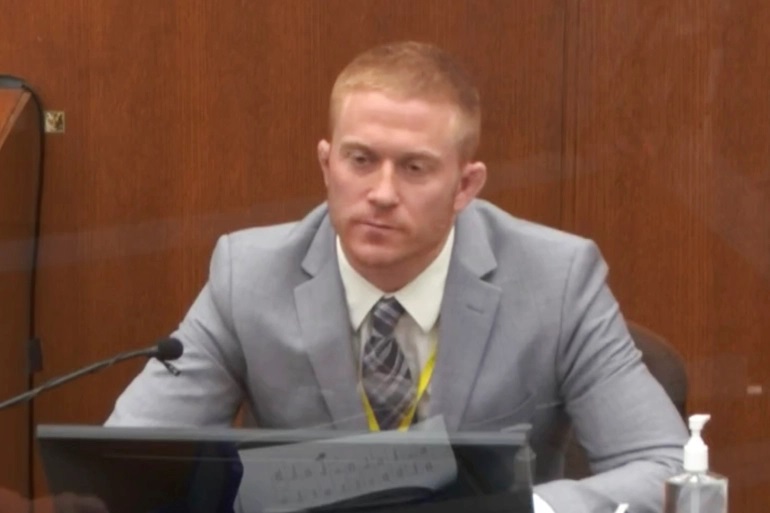A paramedic who came to the scene in Minneapolis, Minnesota last May said he thought George Floyd “was dead” when he arrived he told a US jury Thursday in the trial of the former police officer accused of murder and manslaughter in the death.
The testimony came on the fourth day of the trial of Derek Chauvin, who knelt on Floyd’s neck for more than nine minutes, including after the arrival of the paramedics. Chauvin, then a Minneapolis police officer is white, Floyd was Black. Chauvin and three other officers involved in the incident were fired the day after Floyd died.
Paramedics Seth Bravinder and Derek Smith explained the steps they took to attempt to revive Floyd who was unresponsive at the scene on May 25, 2020.
“In lay terms, I thought he was dead,” Smith said. He said Floyd did not have a pulse. Bravinder said he signalled for Chauvin and the other officers to get off of Floyd so they could put him on a stretcher. Floyd was “limp” Bravinder said.
The two paramedics, assisted by one of the police officers administered chest compressions, medication, and attempted to resuscitate Floyd in the ambulance as he was in “cardiac arrest”, the paramedics testified, meaning he had no heartbeat.
“He was a human being and I was trying to give him a second chance at life,” Smith testified.
 Security is tight outside the Hennepin County Government Center where the Derek Chauvin murder trial is held [Stephen Maturen/Getty Images/AFP]
Security is tight outside the Hennepin County Government Center where the Derek Chauvin murder trial is held [Stephen Maturen/Getty Images/AFP]How Floyd died is a central question in the trial. The prosecution alleges it was because the pressure applied by Chauvin on his neck, the defence is expected to make the case that drugs in Floyd’s system and a pre-existing medical condition played a role. Video of Chauvin kneeling on Floyd’s next was seen widely and sparked global protests against police brutality.
![Advertisement [+233266550849]](https://freshhope1.org/wp-content/uploads/2021/04/Ad1-244x300.jpeg)
She smiled through tears as she recounted how they first met when he offered to pray with her, less than three years before his deadly arrest, and described how they both struggled with opioid addiction.
“It’s one of my favorite stories to tell,” Ross said, smiling towards the jury, when asked by a prosecutor how she first met Floyd in August, 2017, at a Salvation Army homeless shelter, where he worked as a security guard.
“It’s a classic story of how many people get addicted to opioids,” Ross, who wore a heart-shaped brooch on her black jacket, told the jury. “We both suffered from chronic pain: mine was in my neck, his was in his back.”
 Courtney Ross described in court how she and George Floyd both struggled with opioid addiction [Pool via AP]
Courtney Ross described in court how she and George Floyd both struggled with opioid addiction [Pool via AP]On the day they met, she was waiting in the lobby to see the father of her son, tired after closing up the coffee shop where she worked. Floyd approached her.
“Floyd has this great, deep, southern voice, raspy,” she said, “and he was, like, ‘Sis’, you OK, sis’?’”
He sensed she felt alone, and offered to pray with her.
“It was so sweet,” she said, dabbing a tissue to her eyes. “At the time, I had lost a lot of faith in God.”
They had their first kiss in the lobby that night and, but for the occasional break after a lovers’ quarrel, were together until his death, she said.
They took walks in the parks and around the lakes of Minneapolis, which was still new to the Texas-raised Floyd, and ate out a lot: “He was a big man,” she said, describing his daily weightlifting, “and it took a lot of energy to keep him going.” She said he adored his mother, who died in 2018, and his two young daughters.
At times, they took prescribed painkillers. At other times, they illegally obtained opioids. Sometimes they shook the habit, sometimes they relapsed.
“Addiction, in my opinion, is a lifelong struggle,” she said. “It’s not something that comes and goes, it’s something I’ll deal with forever.”
Chauvin’ lead lawyer, Eric Nelson, asked Ross many questions in cross-examination about how the couple got their drugs and an episode where Floyd took himself to a hospital emergency room for what proved to be a non-fatal overdose.
Under questioning from Nelson, Ross also disclosed that Floyd’s pet name for her in his phone was “Mama” – testimony that called into question the widely reported account that Floyd was crying out for his mother as he lay pinned to the pavement.
 Mementos dedicated to George Floyd on display at the Chicago Fine Arts Gallery near George Floyd Square, while in Minneapolis, Minnesota, US [Octavio Jones/Reuters]
Mementos dedicated to George Floyd on display at the Chicago Fine Arts Gallery near George Floyd Square, while in Minneapolis, Minnesota, US [Octavio Jones/Reuters]In some of the video, Floyd can be heard calling out, “Mama!” repeatedly and saying, “Mama, I love you! … Tell my kids I love them.”
Chauvin has pleaded not guilty to murder and manslaughter charges. In a central dispute of the trial, his lawyers have argued that Floyd’s death, ruled a homicide at the hands of police, was really an overdose caused by the fentanyl found in his blood at autopsy.
Prosecutors from the Minnesota attorney general’s office have told the jury they will hear evidence to contradict this, including Ross’s testimony about his drug tolerance, and that Floyd’s drug use is irrelevant to the charges against Chauvin.

